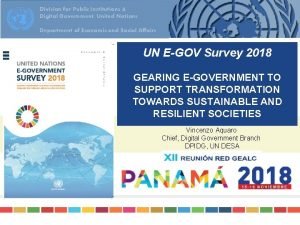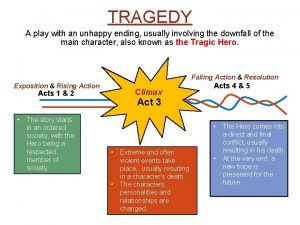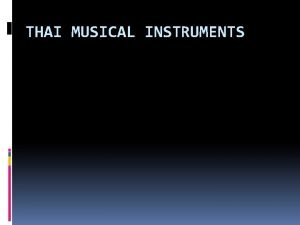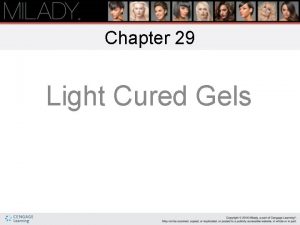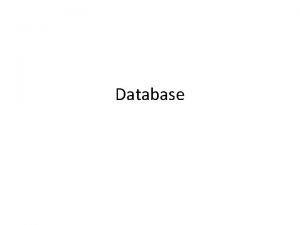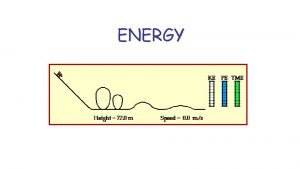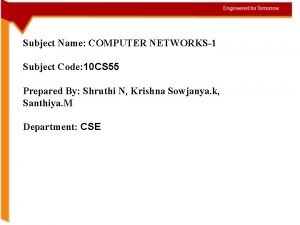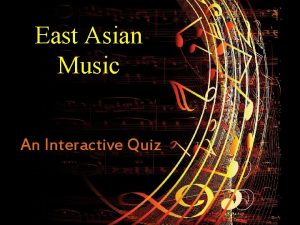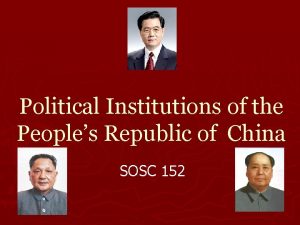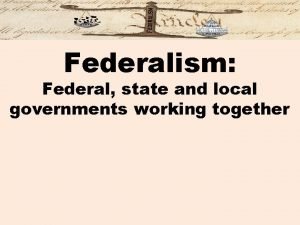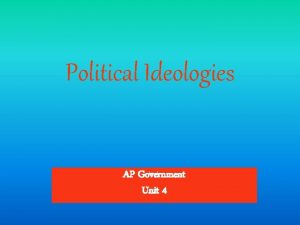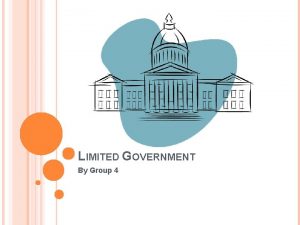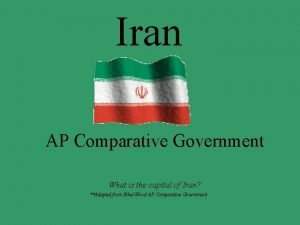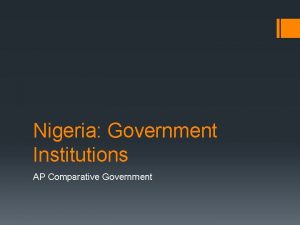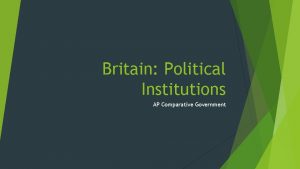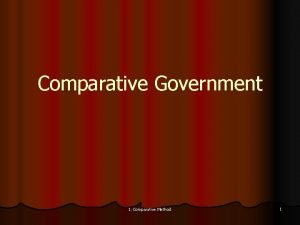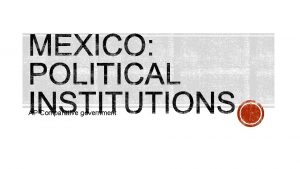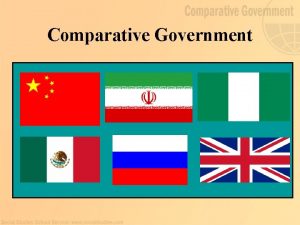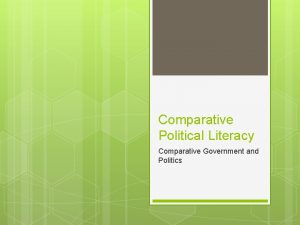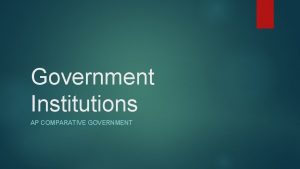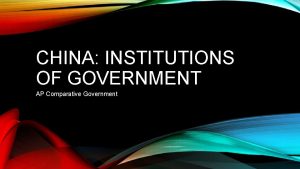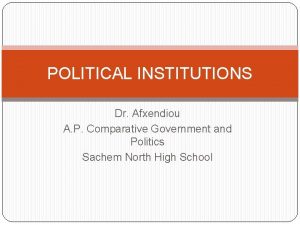Political Institutions AP Comparative Government Political Institutions Traditionally













- Slides: 13

Political Institutions AP Comparative Government

Political Institutions • Traditionally Russian history has dictated a highly centralized government • Under the Soviet Union the government was maintained as a federal government • The Russian Federation also works a Federal system • There are 80 regions, 21 of which are ethnically non-Russian by majority • Most of these regions are termed “republics, ” as they almost all ran themselves independently under Yeltsin • Some Regions are much stronger than others, which leads to the concept of asymmetric federalism

Political Institutions • Putin has cracked down on regional autonomy and sovereignty, using the military to force controlled regions into submission • Putin has extended control by : • • Creating super-districts: Each super district has a presidential appointee who supervises local authorities • Appointment of governors: Rather than governors being directly elected, they are appointed by the president and then confirmed by regional legislatures • Changes in the Federation Council: Putin supported a ban on Duma leaders and governors from serving in the Federation Council (the upper legislative house) • Elimination of single-member-district seats in the Duma: In 2005, Putin initiated a change in Duma representation by moving to a fully proportional system. This eliminated many minor political parties from the Duma, as they could no longer rely on their regional popularity to win a seat in the government. Removal of governors: A law allows the president to remove a governor from office that refuses to subject to local law and national custom

Parties • Russia established an overwhelming number of parties after the fall of the USSR • In the 1995 Duma elections, 43 different parties were on the ballot • By 1999 the number of parties had shrunk to 26 • Parties continue to remain weak and fluid as many Russians have not developed loyalty to the parties • Parties of ideology have been replaced by the idea of parties of power • It is all about getting elected, not about what one believes • This is based upon strong sponsorship by economic and political power-holders

Parties: United Russia • The United Russia party was founded in April of 2001, as merger between the Fatherland All-Russia Party and the Unity Party of Russia • This party is responsible for elevating Vladimir Putin to the presidency in 2000 • As of the 2011 Duma elections, United Russia controls 238 of the 450 Duma seats • In 2004 Putin won the presidency with 71% of the vote • When Putin was reelected in 2012, he received 63. 6% of the vote.

Parties: The Communist Party of the Russian Federation (CPFR) • The Communist Party is the second strongest party in the Duma • The Party has lost significant influence throughout the electoral process and after the 2011 election they only controlled 92 Duma seats, down from 157 in 1995, but up from the 2003 election where they only had 51 seats • Gennady Zyuganov is the party leader and garnered less than 30% of the presidential vote in 1996 • While not as extreme as the old Communist party of the USSR, the CPFR is the least reformist of Russian parties

Parties: Reformist Parties • Yabloko: • This party has taken the strongest stand for pro-democracy and it generally does best among intellectuals who have supported reform since the days of Gorbachev rule • Grigori Yavlinski is the leader of the party and came in third in the Russian presidential election of 2000 but only received 5. 8 % of the vote • In 2003 the party only won 4 seats in the Duma • Today the party has 0 seats in the DUma • Union of Right Forces: • This party emphasizes the development of a free market and backs further privatization of industry • This party has 0 seats in the Duma

Parties: Liberal Democrats • This party is headed by Vladimir Zhirinovsky • He regularly attacks reformist leaders and disliked Yeltsin • He has implied on a regular basis that under his leadership Russia would use nuclear weapons on Japan and he is openly anti-Semitic. • He is also openly sexist • Liberal Democrats currently have 56 seats in the Duma

Elections: • The Russian political system supports three types of national votes: • Referendum- The Constitution of 1993 allows the president to call for national referenda by popular vote on important issues • Major Referenda: • Job Performance of Yeltsin • Approval of Constitution of 1993 • Regional Referenda to approve Chechnya constitution

Elections • Duma Elections-Until 2007, half of the seats in the Duma were chosen from single-member districts and half of the seats stem from proportional representation • Today all Duma seats are assigned by proportional representation. • • According to Putin, this was done to make policymaking more efficient. It also had the affect of reducing the power of regional governments. Parties must gain 7% of the total vote in order to get any seats according to proportional representations rules. Elections have a two-round pattern. • Presidential Elections • Presidential elections can also follow a two-round model • • Since the 2000 election, two rounds were not needed to decided who the president would be because Putin and Medvedev received above 50% of the vote. In 2001 a law restricted the right of small, regional parties to run presidential candidates, so fair elections are largely criticized.

Interest Groups: The Oligarchy • The oligarchy came to power under Yeltsin • The oligarchy took advantage of Yeltsin’s inattention to his presidential duties, and soon monopolized Russian industries and built huge fortunate • Boris Brezovsky is one of the best-known oligarchs • He and six other entrepreneurs controlled over half of the Russian GNP • He controlled holdings in the oil and media industries • Putin showed resistance to the oligarchic control • Those who have crossed Putin have been arrested for corruption and have slapped their companies with massive fines • The majority of the oligarchs have largely left political life

Interest Groups: State Corporatism • Under Putin state corporatism was established • State corporatism revolves around the state determining which groups have input into policymaking • The Russian government has vast holdings in automobile and aircraft manufacturing, shipbuilding, nuclear power, diamonds, titanium, and other industries • If the leaders of the businesses are not seen as loyal to the president they can be forced to sell their companies by threatening legal action or imposing large financial fines • Those that keep their business because of loyalty are taking part in insider privatization

Interest Groups: The Russian Media • The news papers and television stations are privately owned in Russia, however the state controls many of them • There is little clarity on the concept of freedom of press • Many news organizations have been shut down after criticizing the government and reporters have been imprisoned and some have mysteriously died • There have also been long delays in coverage of important news stories taking place in the country
 Division for public institutions and digital government
Division for public institutions and digital government Traditionally the internet checksum is
Traditionally the internet checksum is Works written by shakespeare often have an unhappy ending
Works written by shakespeare often have an unhappy ending Ranat ek classification
Ranat ek classification Light cured gels are not:
Light cured gels are not: Traditionally, composed of a collection of file folders.
Traditionally, composed of a collection of file folders. Energy is defined as the ability to
Energy is defined as the ability to Computer subject code
Computer subject code East asian music
East asian music Political institutions in sociology
Political institutions in sociology National powers
National powers Political ideology definition ap gov
Political ideology definition ap gov Limited government cartoon
Limited government cartoon Capitalof iran
Capitalof iran
